Guate Votes Resounding "Yes" to ICJ Referendum

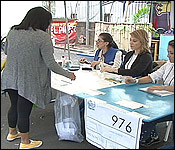
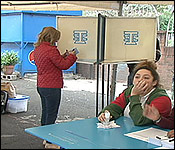

 Guatemala has voted yes to go to the ICJ with the Belize - Guatemala territorial dispute. The referendum, or - as they call it - "Consulta Popular" was held yesterday, and it was a decisive outcome: 96% of the 1.9 million voters said "yes", while only 75,000, or 4% said "no" to the ICJ.
Guatemala has voted yes to go to the ICJ with the Belize - Guatemala territorial dispute. The referendum, or - as they call it - "Consulta Popular" was held yesterday, and it was a decisive outcome: 96% of the 1.9 million voters said "yes", while only 75,000, or 4% said "no" to the ICJ.
And while 1.9 million votes may sound like a whole lot, voter turnout was low at 26% of the electorate - and throughout the day, there were many stories in the Guatemalan media about how slow it was at the polling stations.
Our Daniel Ortiz and Codie Norales were in Guatemala City for the vote, and they have this story:...
Daniel Ortiz reporting
Here in Guatemala City, like the rest of the country, Guatemalans joined the lines on a Sunday to say yes or no to taking their territorial claim to Belize to the ICJ.
The referendum became reality almost a decade after the Special Agreement was signed. That's where both countries committed to go to the ICJ - after getting approval from dual referendums.
But, for about half that time, Guatemala's leaders were indecisive, giving one reason one reason or the other to postpone.
Finally, after five years of flip flopping, they took the plunge, marking a decisive turn in the 200+ year-old dispute.
 H. E. Alexis Rosado - Ambassador to Guatemala
H. E. Alexis Rosado - Ambassador to Guatemala
"It's a historic day. I should say that I am pleased that you could make it, the Belize media houses. I understand that there are other media houses coming. It's important for the Belizean people to follow the process. It's historic."
But, while the dispute is rich in history, we wondered just how much Guatemalans know about the core issues, and why they were voting today. Around the City, we found people who were very knowledgeable:
Edgar Dionicio - Guatemalan
"I think that we should vote yes. I think that we all have this right to decide whether to have this set boundaries, so we can all get the benefit out of it. I feel like we need to have that piece of mind that we know what belongs to who."
 Carlos - Guatemalan
Carlos - Guatemalan
"I vote yes."
Reporter
"Why yes?"
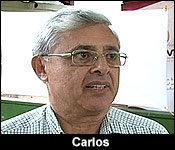 Carlos - Guatemalan
Carlos - Guatemalan
"Because we have an opportunity to resolve the problem, long time ago. We recognizes that Belize is another country, but we have common frontiers borders."
Reporter
"Personally, would you support the government if they should push for Belize to return back to Guatemala's ownership?"
Carlos - Guatemalan
"No."
Reporter
"Why not?"
Carlos - Guatemalan
"Because the people of Belize has sovereignty to territory."
Reporter
"Do you think that they are many Guatemalans who think like you?"
Carlos - Guatemalan
"I think so."
 Francisco - Guatemalan
Francisco - Guatemalan
"Belize and Guatemala needs to have their correct border and they don't have a border. And if we don't have a border, it's the problem right now. We need to define the border. It's not that Belize will be part of Guatemala, no. Belize is a country and Guatemala is a country, but we have to define what is the border."
Reporter
"What do you think of Belize and Guatemala? Do you think that Belize is part of Guatemala?"
Danika Martinez - Guatemalan
 "Belize was part of Guatemala, but not anymore. I know that we are fighting for a piece of place, but Belize is not part of Guatemala anymore."
"Belize was part of Guatemala, but not anymore. I know that we are fighting for a piece of place, but Belize is not part of Guatemala anymore."
Reporter
"Would you want it to remain a separate country or would you personally want it to be part of Guatemala?"
Danika Martinez - Guatemalan
"They are a country and we are a country and I think that we have to wait for results in Belize."
 Michael - Guatemalan
Michael - Guatemalan
"At the starting of the year, they started with this consulta popular and they started like showing all the information the reason why this was happening and some people decided not to pay attention I think. I was talking to some people here and they are thinking like part of Belize is for us and that's kind of a funny thing, because it's not really what is happening."
Even in a city steeped with history, some people didn't appear to understand the importance of this referendum.
Reporter
"Will you vote for the referendum or have you voted?"
 Interviewee 1
Interviewee 1
"I will vote, right now I'm going to vote."
Reporter
"How will you vote? Yes Or No?"
Interviewee 1
"I will vote yes so we can get back Belize. Yes."
Reporter
"What do you know of the issue of the dispute between Belize and Guatemala?"
Interviewee 1
"The only thing I know is that it belongs to us, that territory, yes."
Reporter
"What do you know of Belize?"
Interviewee 1
"I wouldn't be able to tell you."
Reporter
"You don't know anything about Belize, but you do think that Belize belongs to Guatemala?"
Interviewee 1
"Yes I think a portion belongs to us, yes."
Reporter
"Why did you vote yes?"
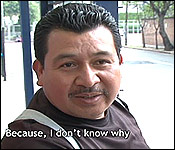 Interviewee 2
Interviewee 2
"Because, I don't know why they sold Belize, Belize is ours."
Reporter
"Will you vote for Yes or for No?"
Interviewee 3
 "Ah it has to be for Yes?"
"Ah it has to be for Yes?"
Reporter
"Why?"
Interviewee 3
"To see if what they propose get better."
Reporter
"Do you know any details of Belize as a Country?"
Interviewee 3
"Yes."
Reporter
"What do you know?"
Interviewee 3
"Well they say they sold it but I don't believe it is so."
Reporter
"Will you vote yes or No?"
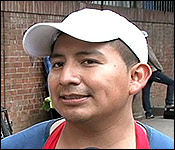 Interviewee 4
Interviewee 4
"Yes. To recover part of the Guatemalan properties which were lost due to corruption among the past presidents more than anything else."
So, since some of our interviewees missed the point of the referendum completely, we tried to get an idea as to why many Guatemalans didn't understand why they were voting. Who better to turn to than members of the Guatemalan press, who have been following the Guatemalan Government's education campaign closely. Alexis Ponce, a journalist from Albavision, and Mercedes Zucena, a journalist from the Canal Antigua TV were willing to explain.
Translated:
Alexis Ponce - Journalist, Albavision
 "There are persons who have no idea, mainly the younger people who are not aware. They have had minimal information relating to this dispute. But, there are older persons who are above 50 years who have greater understanding of the situation, like we're seeing in today's voting. They are the ones who are going to the different polling stations to cast their votes."
"There are persons who have no idea, mainly the younger people who are not aware. They have had minimal information relating to this dispute. But, there are older persons who are above 50 years who have greater understanding of the situation, like we're seeing in today's voting. They are the ones who are going to the different polling stations to cast their votes."
Mercedes Zucena - Journalist, Canalantigua TV
 "There have been many controversies on this topic in respect to this topic because they were misinforming - there was certainly misinformation. The public is not well informed with respect to the implications of this referendum."
"There have been many controversies on this topic in respect to this topic because they were misinforming - there was certainly misinformation. The public is not well informed with respect to the implications of this referendum."
Misinformed or not, the Guatemalans were being asked to make this major decision
Translated:
Maria Eugenia Mijangos Martinez - President, Tribunal Supremo Electoral
"We are ready. The day has come for the referendum."
In the past 2 referendums, Guatemala had very low voter turn out - less than 20%, especially when compared to the robust Presidential Elections.
So, for the first few hours, when the Guatemalans were only trickling in, and it did give cause for concern that nobody was truly interested to be heard on whether or not to take the case to the ICJ
Edgar Dionicio - Guatemalan National/Referendum Official
"It's been less than what we expected to see. I think that expected to see a little more people giving their thought about the situation. But we do appreciate the fact that people has been coming by."
But, by the end of the day, 26% of Guatemala's approximately 7.5 million eligible voters came out and voted overwhelmingly to take the claim to the ICJ.
Translated:
 Maria Eugenia Mijangos Martinez - President, Tribunal Supremo Electoral
Maria Eugenia Mijangos Martinez - President, Tribunal Supremo Electoral
"At the end of this long civic day, we have a lot to be grateful for. We have carried forward this commission progress, whereby the people of Guatemala have responded beyond our expectations."
Indeed, the turnout was beyond expectation; the 26% was the highest turnout ever recorded for a referendum in that country. The previous highest turnout for a referendum was 18% in 1999. The 96% yes vote is also the most decisive outcome from any referendum in that country's history. And, yes, even though only a quarter of the electorate voted, it is a valid and binding outcome under Guatemalan law.
And, so, today, it was a feast of congratulations for Guatemala, from Belmopan to the British Embassy in Guatemala City.
First, the Belize Ministry of Foreign Affairs sent out a release congratulating the Guatemalans, and adding, quote, "The Government acknowledges the results as a step further toward permanently settling the age-old dispute…the Government of Belize is committed to conducting its own referendum for the electorate to decide whether we should submit Guatemala's claim to the ICJ for a final settlement. A date for this will be set after the national re-registration exercise has produced a new and robust electoral roll." End quote.
The British Embassy in Guatemala sent out a release saying it welcomes the outcome of the referendum, quote, "to bring the territorial, maritime and insular dispute with Guatemala before the ICJ," end quote.
And, today in the UK, Foreign Minister Wilfred Elrington met with MP Allan Duncan at the Commonwealth Heads of Government Meeting. Duncan tweeted, quote, I've just met Foreign Minister Elrington of Belize…fully support his ambition to hold their own referendum as soon as possible."
Former Guate F.M. Ecstatic About "Yes" Vote
While our news team was in Guatemala City, we ran into former Foreign Minister Carlos Raul Morales.
While he's no longer a member of Government, he still had a leading role in the public education campaign. We asked the Morales to discuss the outcome of the referendum, and, not surprisingly, he was very pleased that Guatemalans want to take their claim to the ICJ. Here's what he had to say:
Carlos Raul Morales- Former Guatemalan Foreign Minister
 "It is a clear message of the Guatemalan people that we want peace. This is for me the most important message. Guatemalan people are people that love peace. And a lot of the Guatemalan people are not aware of the issue with Belize. They only know about Belize when someone dies in the adjacency zone and there are sentiments, very special feelings when someone dies. Our message to Belize is that we are going to be neighbors forever, we have a problem, we have an issue, we need to solve that issue. But the message that the 96% of people said 'yes' is to give a solution to a problem we have in the International Court of Justice in a peaceful way; there is no other way. The message we want to send to Belize is that we need to go to the ICJ to establish a border. I know for Belize there is a border but it is not marked in the land, it is not marked in the area, in the field and it is important to determine. It is important to chop the nature of this line and to build some monuments that show where exactly the border is between Guatemala and Belize. Sadly we have this issue. It was not my decision to have this issue. It was not your decision to have this issue. We are hurting for the decision of our grandfathers, from our fathers and now our generation has the opportunity to give a solution to this issue. For me, this message of the Guatemalan people is very clear; we want to live in peace with Belize. Please, Belizean people, don't take the result of this referendum to mean that we want to take Belize. I think there is a misunderstanding and people don't understand what is the meaning of the claim. Guatemala and Belize have rights; well, let's go to the ICJ, let's define those rights. The worst thing that could happen is that the treaty of 1859 will be valid."
"It is a clear message of the Guatemalan people that we want peace. This is for me the most important message. Guatemalan people are people that love peace. And a lot of the Guatemalan people are not aware of the issue with Belize. They only know about Belize when someone dies in the adjacency zone and there are sentiments, very special feelings when someone dies. Our message to Belize is that we are going to be neighbors forever, we have a problem, we have an issue, we need to solve that issue. But the message that the 96% of people said 'yes' is to give a solution to a problem we have in the International Court of Justice in a peaceful way; there is no other way. The message we want to send to Belize is that we need to go to the ICJ to establish a border. I know for Belize there is a border but it is not marked in the land, it is not marked in the area, in the field and it is important to determine. It is important to chop the nature of this line and to build some monuments that show where exactly the border is between Guatemala and Belize. Sadly we have this issue. It was not my decision to have this issue. It was not your decision to have this issue. We are hurting for the decision of our grandfathers, from our fathers and now our generation has the opportunity to give a solution to this issue. For me, this message of the Guatemalan people is very clear; we want to live in peace with Belize. Please, Belizean people, don't take the result of this referendum to mean that we want to take Belize. I think there is a misunderstanding and people don't understand what is the meaning of the claim. Guatemala and Belize have rights; well, let's go to the ICJ, let's define those rights. The worst thing that could happen is that the treaty of 1859 will be valid."
As you saw in our story, there were Guatemalans who voted in the Referendum without a having a clue as to what a "yes" vote actually meant. Our colleagues from other Belizean news in Guatemala reported encountering Guatemalans who were similarly confused about the meaning of the referendum.
So, we challenged the Former Guatemalan Foreign Minister on that and here's what he had to say:
Daniel Ortiz - Reporter
"We've walked around Guatemala City as best as we can, it is a huge city, and we've encountered quite a bit of people who believe that a yes vote is to go reclaim Belize. It is an unfortunate situation. Did the Guatemalan government, for which you were once a part of, fail to properly educate all its citizens?"
Carlos Raul Morales
"I got involved in the education process and, you can review my interviews, I never said we are going to take Belize back. What I said is that we believe we have rights, which is different, it is very different. And the only institution that can solve those rights is the ICJ. I am not part of the government anymore, this is clear, but if you review my education process- because I took some leadership in this process- I said very clearly: we need to solve this claim with Belize for the peace. I am not part of the government anymore, I cannot give an explanation as to what the president said but what I can assure you is that most of the people I know, and most of the Guatemalan people, what they want is to solve this situation with Belize. Definitely, there are some sectors that believe that Belize is part of Guatemala but I cannot do anything about that. And most of those people vote 'no' because the people that vote 'no' believe that Belize is part of Guatemala and they don't want a solution with the ICJ."
Marisol Amaya - Reporter
"There were some people who said they would have voted 'yes' but there understanding of the question was that it is simply to deepen or strengthen trade between Belize and Guatemala, so a lot of people were misinformed. Do you think that that makes the process flawed that the education campaign did not reach a large sector of the population?"
Carlos Raul Morales
"No, it is not a large section of the population. There are misunderstandings but I can assure you that most of the people, most of the 96% are people that want peace. I can assure you that. There are some people definitely yes that believe differently, particularly people that voted no. But I can assure you that most of the 90% of the people want peace with Belize, I can assure you that."
As you heard, Morales claims that the outcome of the referendum sends a strong message that "Guatemalans want peace". So, is the converse true as well? If Belize votes no, will it be interpreted that we don't peace? The dispute can only go to the ICJ for settlement IF both countries vote "YES".
If Belizeans vote yes, then it all goes according to plan and the territorial claim will be heard by the ICJ.
But, if Belizeans vote no, then the ICJ push ends abruptly, and then it's back to the drawing board. But in the process, Belize may be maligned as rejecting a peaceful resolution to the claim.
We asked Morales about the possibility that Belize may vote "no":
Carlos Raul Morales- Former Guatemalan Foreign Minister
"It is coming from 1821, from almost 200 years ago. And my law doesn't allow me to recognize Belize's borders. If I do that I will go to jail in Guatemala. It is a matter of law. It is the same in Belize. You cannot give us back Toledo for example. Then, if your law doesn't allow us to give a solution to this problem and my law doesn't allow us to give a solution, what we need to do is to build a solution at the ICJ."
Marisol Amaya- Reporter
"A referendum is a democratic process. What happens if Belizeans vote no?"
Carlos Raul Morales
"Well, if Belize votes no, you need to look for the legal mechanisms to go to the ICJ. The problem now is that, and I am asking you, is the solution to live with the problem forever? I ask you."
Ambassador Alexis: "Is the Pressure now on Belize?"
So, what happens next? Well, now that the Guatemalan electorate has said "YES", it wants to resolve the dispute at the ICJ - they must wait and see what the Belize electorate says.
So, now, the pressure and scrutiny is squarely upon Belize, since the Guatemalans have given their emphatic yes vote.
We asked Belize's Ambassador in Guatemala, Alexis Rosado if Belize is under pressure to produce a "yes" vote in Belize. Here's what he had to say:
H. E. Alexis Rosado - Ambassador of Belize to Guatemala
 "Well, it is a historic occasion. It is a big step in the direction we had already agreed upon in 2008 when we signed the special agreement. It will now required for Belize to prepare and conduct its own and we will see how that goes."
"Well, it is a historic occasion. It is a big step in the direction we had already agreed upon in 2008 when we signed the special agreement. It will now required for Belize to prepare and conduct its own and we will see how that goes."
Daniel Ortiz- Reporter
"Now, sir, the former Guatemalan Foreign Minister has suggested that this is a clear indication that Guatemalan's want peace. Should Belizeans vote 'no', the suggestion or the clear implication there is that Belizeans, if they vote 'no', don't want peace."
H. E. Alexis Rosado
"Well, I haven't heard what whoever said. So, I wouldn't want to comment on that but we all know that as Belizeans we are a peace-loving people, that is our vocation. So, we have relied on the international system for our own security as an independent state, with sovereignty and territorial integrity. We have always depended on the international system to support our cause. We have always maintained that our title to our territory is based on the international legal system that now prevails in the international system."
Daniel Ortiz - Reporter
"Do you feel especially pressured to try to convince the Belizean people to vote yes, since there is a clear interpretation and a spin on it, should Belizeans decide to vote 'no'?"
H. E. Alexis Rosado
"Well, I don't know about pressure. At the end of the day, we are pressured either way. We are pressured into not resolving a dispute that has been really behind our backs for a long time that has disturbed the peace on many occasions. So, looking at it from that point of view, we've always known that this day would come when Belizeans would be asked to decide. The important thing now is that Belizeans are well informed."
Daniel Ortiz
"Do you think the international community will look unfavorably on Belize should we vote 'no' when Guatemala has so clearly said 'yes'?"
H. E. Alexis Rosado
"I think that will be a tough call when and if that time comes but I wouldn't want to speculate on what the international community will be thinking."
Channel 7

